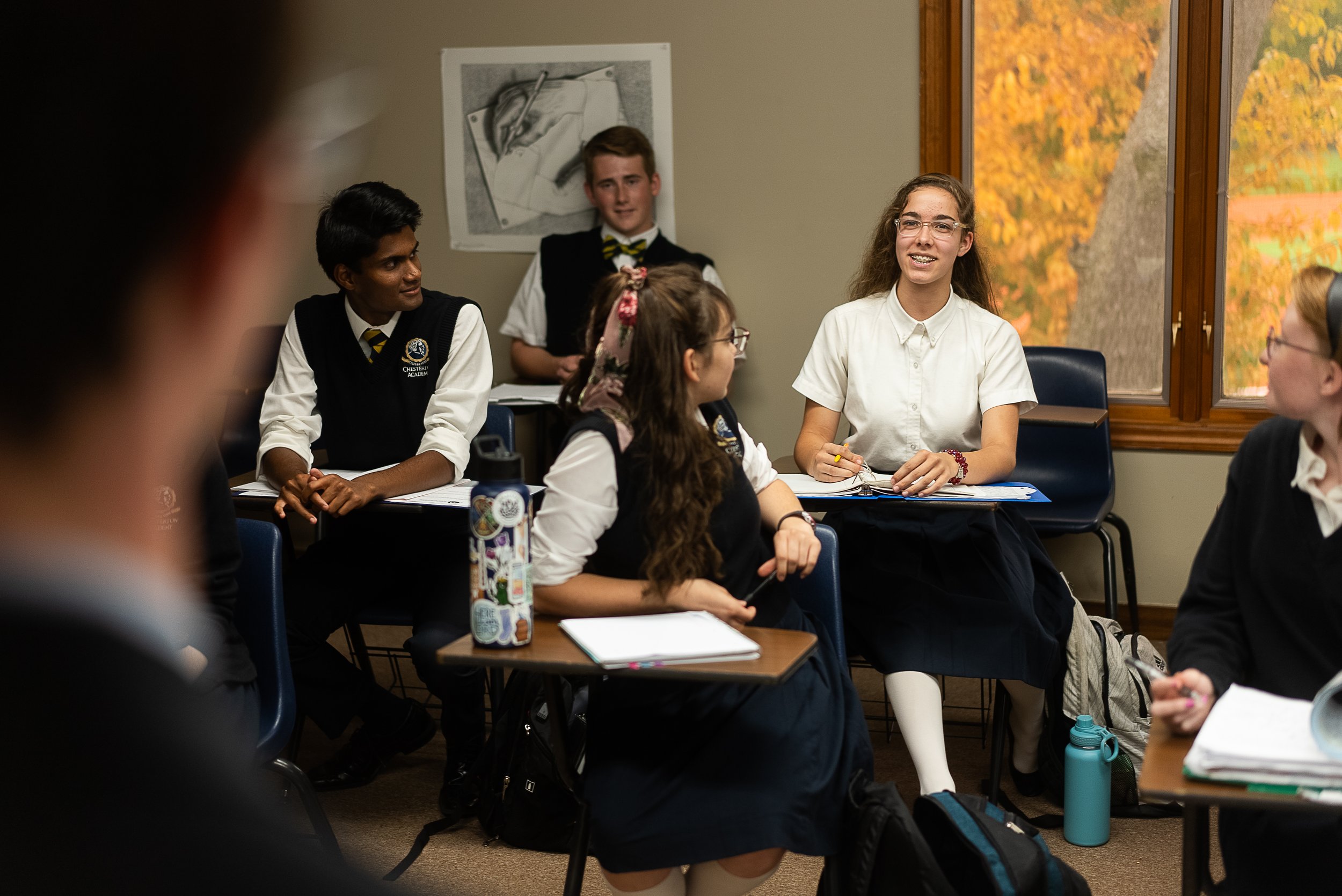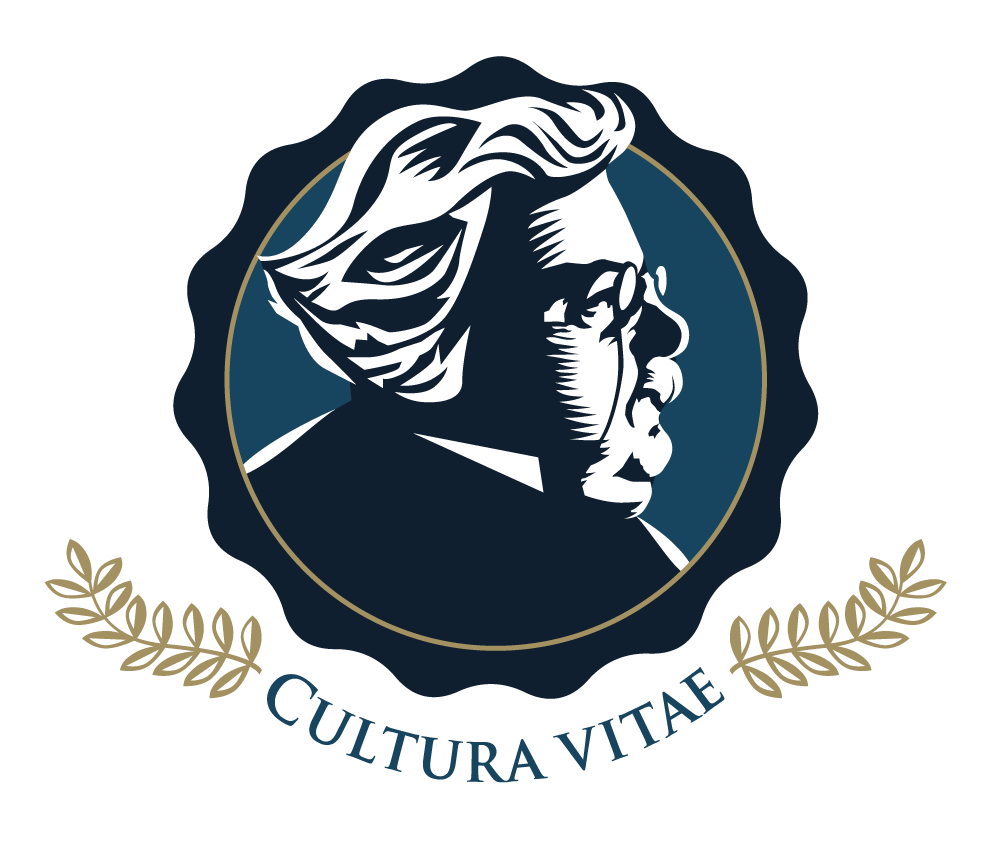
Academics
Our Curriculum
Students at Chesterton Academy enjoy a cohesive, content-rich education. A broad exposure to many different disciplines helps students expand their interests and uncover hidden talents. Each year builds on the previous, so that by the end of senior year, our students are articulate, clear-thinking, well-rounded, and, very importantly, joyful individuals.
The Humanities Program
History, literature, philosophy, theology, and languages are braided together in an integrated curriculum utilizing the Socratic Method.
-
Grade 9: Ancient World
Grade 10: Early Medieval Period
Grade 11: High Middle Ages to the Renaissance
Grade 12: Modern World -
Theology, “the study of God,” is the context by which all other texts are studied. The principal theological texts studied are the Bible and the Catechism of the Catholic Church. We also read selections from the Church Fathers, Documents of the Church Councils, and Papal Encyclicals.
-
Philosophy, “the love of wisdom,” exercises the brain while it elevates the soul. The ability to understand abstract concepts leads to clear and systematic thinking in all things. We use philosophy to connect the humanities, but also to show its obvious connection to logic and mathematics. We study the development of philosophy from its classical roots focusing on Plato and Aristotle, its dramatic encounter with the early Church, its christening by St. Thomas Aquinas, and its deterioration in the modern era.
-
The history classes at Chesterton Academy form the backbone of our curriculum. The four-year history sequence covers ancient history through the Greek and Roman civilizations, early Church history, the Middle Ages, the Renaissance, and the Reformation and Counter-reformation. In senior year, students study the modern era, including the American and French Revolutions, the Industrial Revolution, the Communist Revolution, and the Sexual Revolution. Each history course is tailored to provide a colorful backdrop for literature, art, and science classes.
-
Our study of literature is tied to the study of history and the rest of the humanities. Students are first introduced to classical epics of Homer and then exposed to early English classics such as The Canterbury Tales and modern literary renderings of medieval history. Moving towards the modern period, they read Dante, Shakespeare, Dickens, Dostoevsky, Chesterton, and American literature. Reading and writing go hand in hand, and each student masters the art of the essay in their writing assignments in all subjects.
-
The study of economics provides perhaps the best example of the problems caused by the fragmentation in modern thought. Economics is not an autonomous, isolated science, but is a derivative of the religious concepts of the culture within which it operates. When a society’s economic principles are divorced from Christian principles, it is certain to have a detrimental effect on the culture. During the senior year, key texts are read in conjunction with the study of modern history and in the light of Church teaching.
-
The study of a foreign language is required of all students for three years. All students are required to take two years of Latin. Because students may have already studied a foreign language before they arrive at the school we try, as much as possible, to place them in the correct level right from the start, regardless of their grade.
The Math & Science Program
Math and science are intimately connected; the logic of math is seen in philosophy and God’s handiwork is seen in the sciences.
-
Mathematics is the art of measuring. Science is the study of what can be measured. While math is woven together with the sciences, it is also connected to the humanities. It teaches logic, which is a basic philosophical principle. It teaches balance, which is a basic aesthetic principle. Math at Chesterton Academy covers Euclidean geometry and algebra, all the way through advanced Calculus.
-
Foundations Track: Euclidean/Analytical Geometry - Algebra I - Algebra II/Trig - Pre-Calculus or Statistics
Traditional Track: Euclidean/Analytical Geometry - Algebra II/Trig - Pre-Calculus - Calculus or Statistics -
Science is the study of the physical world, that is, of God’s creation. None of these subjects can be approached without a sense of wonder. It is fitting, therefore, to begin by looking up at the heavens, at the lights in the sky: Astronomy. Then we take a look at the world God created (Geology), the creatures he created (Biology), and the intricate substances of which all things are made (Chemistry). We end by gaining an understanding of the nature and properties of matter and energy (Physics).
-
Grade 9: Astronomy and Earth Sciences
Grade 10: Biology
Grade 11: Chemistry
Grade 12: Physics
The Fine Arts
Equal emphasis is given to the arts, so that every student learns to draw and paint, sing in the choir, act on the stage, give speeches, and engage in debate.
-
Music appeals to the ear and the mind, the emotions and the intellect, the senses and the spirit. The Church has always considered music as an essential component of meditation and worship. It touches a “chord” and fills a need that is beyond what sight and words can achieve alone. In fact, few could deny that music is the most direct path to touching the soul. The power of music with our young people today is undeniable, and it is imperative that they should learn to recognize the difference between music that glorifies God, elevating the soul, and music that seeks to alienate us from Him. Because music is so abstract it is often difficult to make these judgments and the study of music is probably one of the most complex disciplines the students will experience. It involves not only the learning of music fundamentals (theory, performance, ear training, music analysis and appreciation) but also Music History, where we look at music in the context of the times and philosophy of the period in which it was created. This is especially interesting as we study the role of music throughout Church History and specifically its role in the Catholic Mass. During the Freshman year, the emphasis is placed on basic musical terms and skills. Music History begins in earnest during the Sophomore year in conjunction with the Humanities curriculum.
The best way to learn music, of course, is to perform it. Students are given many opportunities to perform throughout the year with the Chesterton Academy Choir.
-
A complete education must include the development of the creative nature and must provide students with the tools and the technique with which to express their ideas, their feelings and their love. It must also include the analytical skills with which to judge a work of art and exposure to great art. Finally, the mechanical skills and the aesthetic aptitude must be put into the proper context of eternal Truth. A good artist is a complete thinker and vice versa. The influence of the arts in today’s society cannot be overstated, and this is why art is mandatory at Chesterton Academy all four years.
-
Grade 9: Ancient Art History | Drawing and Calligraphy
Grade 10: Late Roman and Early European Art History | Pastels and Colors
Grade 11: Late Gothic, Renaissance, and Baroque Art History | Oils
Grade 12: Classical, Romantic, and Modern Art History | Oils -
Classical drama arose from religious rituals and modern drama has its origins in the staging of the first Christmas play by St. Francis of Assisi. It was the separation of the arts from religion that brought about meaningless art. Great emotion has been spilt upon the ground and down the drain because it is no longer directed to its proper use. The dramatic arts are particularly powerful in our present culture where movies and the media are often the primary source of knowledge and ideas for many young people. It is therefore imperative that students learn as much as possible about this potent art form. Drama involves the study of how words are brought to life and in order to successfully do this on stage the actor must understand more than just his character. He must learn to see the work as a whole, to understand the author’s vision, and sometimes even the time in which it was written. In other words, the actor must learn to be a good literary critic, a good philosopher and sometimes even a good historian. This is where the skills learned in other classes at Chesterton Academy benefit the students greatly.
Drama has the added benefit of being a team activity where students work together for a common goal. It is always a powerfully bonding experience that they will always remember.
At Chesterton Academy drama begins in Sophomore year where the students are introduced to basic acting skills. They present several scenes or a short one-act play. It continues into their Junior and Senior years where they perform a full-length play which often includes Shakespeare.



